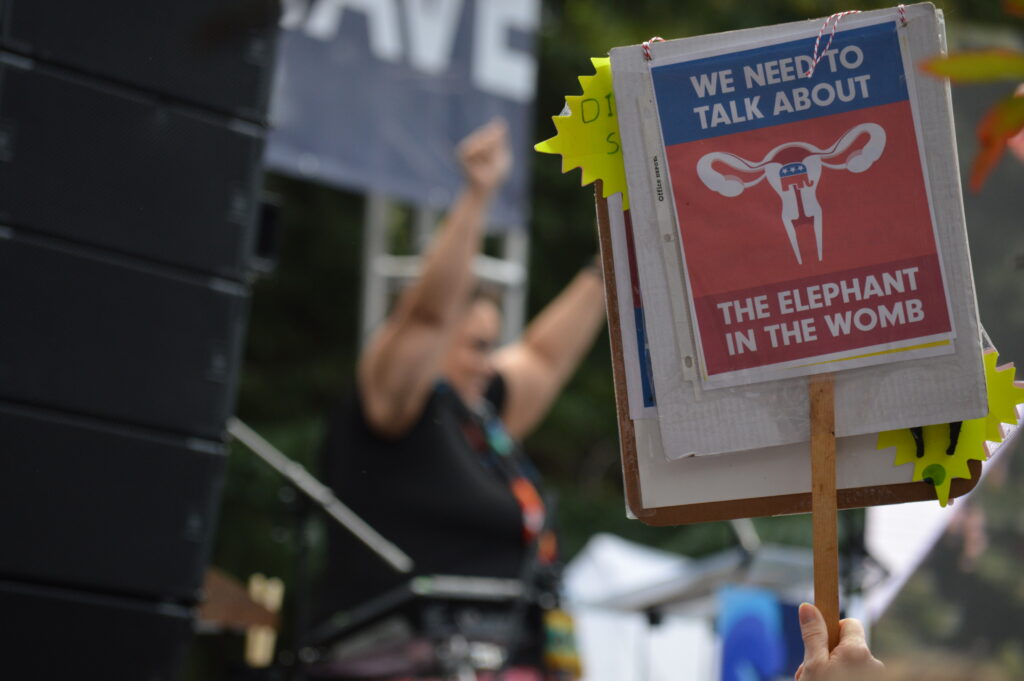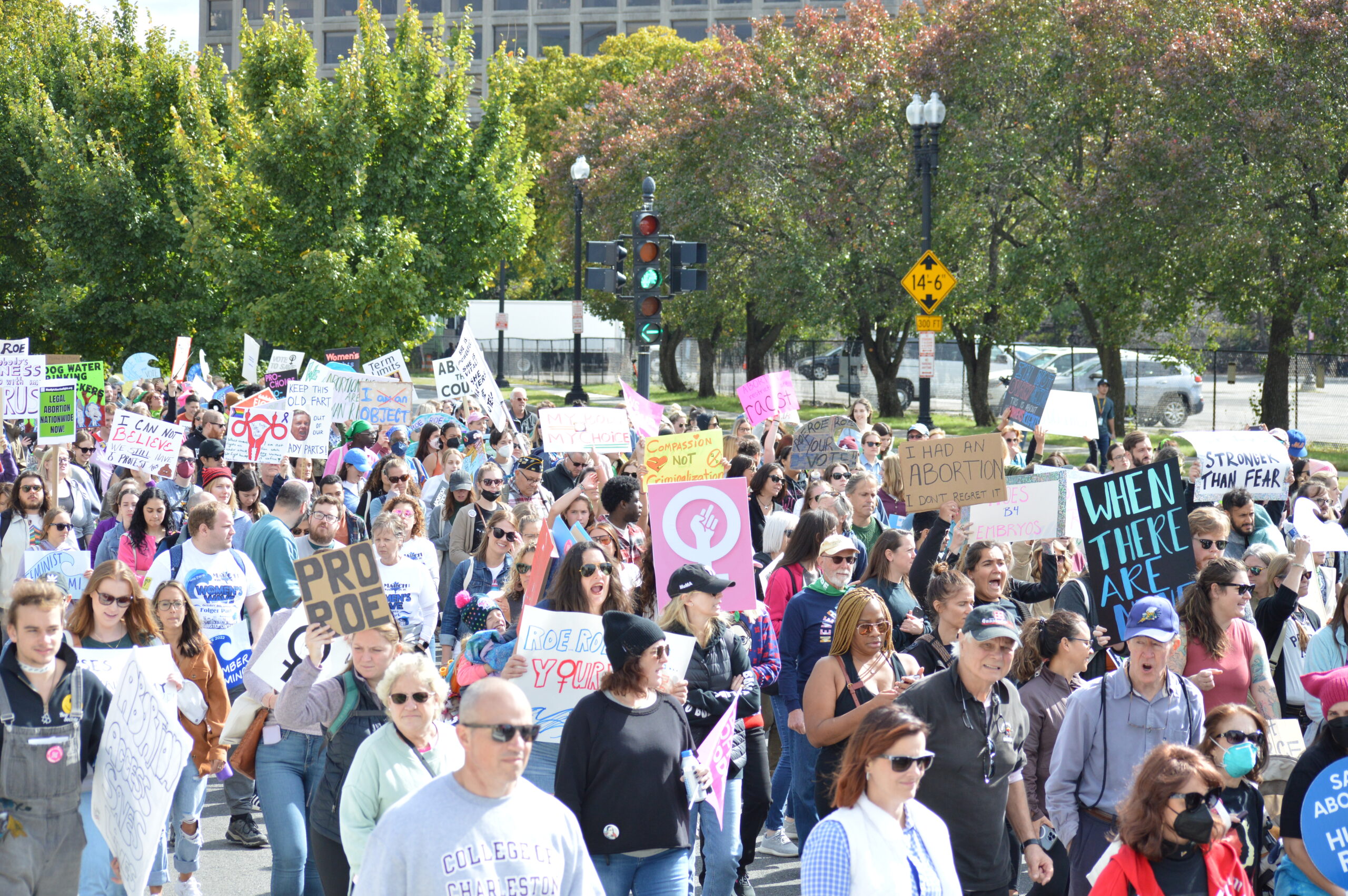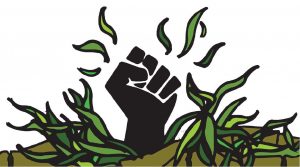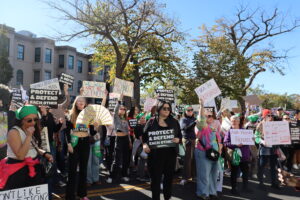“I served my country proudly,” Jessica MacGregor said. “Part of the reason I did that was because I wanted to protect people’s rights and freedoms. I certainly didn’t do it so they could be stripped away.”
MacGregor, a disabled veteran, traveled from North Carolina with her fiancé to protest for equal rights for women at the Women’s March. She was one of many.
Thousands of protesters gathered in Folger Park in Southeast Washington, D.C. on Saturday to rally and march for women’s rights, with special emphasis placed on abortion rights in the wake of the overturning of Roe v. Wade this summer. The day was scheduled to begin at 11 a.m., with a rally taking place at noon. Attendees began marching at 1:30 p.m. towards Union Square, in front of the Capitol Building.
Though rallies in years past focused heavily on abortion rights, this year’s march placed greater emphasis on encouraging women to vote for Democrats—who tend to protect abortion rights—in the midterm elections this November.
Among the marchers— which included volunteers in neon jackets, parents pushing children in strollers, and demonstrators with signs marching toward the Capitol— the separation of church and state was a prevalent demand.
Michaela Clingman, who carried a sign reading, “WE’RE DYING. IS YOUR GOD PROUD YET?” believes that politicians who use anti-abortion religious values over science to guide how they vote present one of the biggest obstacles to abortion rights.
“We don’t have any kind of grasp of science in our policies. Women who are trying to get cancer treatments that are postmenopausal are not able to get them because it’s methotrexate, and it also happens to be used for abortion,” Clingman said.
Beyond making cancer treatments less accessible and the unintentional consequences of abortion bans, participants made clear that abortion in itself is life-saving healthcare for many.  Photo by Jo Stephens
Photo by Jo Stephens
Reverend Kaji Dousa, who represented both Planned Parent Park Avenue Christian Church and Planned Parenthood’s Clergy Advocacy Board announced this clearly to the rally: “Abortion is for people who need care for their God-given bodies”.
Similar marches took place in hundreds of cities across the country, each with the same overarching pro-abortion and “Women’s Wave” (referring to a “wave” of female voter turnout) messages.
International women’s rights were also a central part of the event, which placed particular focus on the rights of women in Iran after the killing of Mahsa Amini, who died in Iranian police custody after being arrested for allegedly wearing her hijab too loosely.
Monir Mosh was among those who attended in support of the women of Iran.
“We’re here because we want control over our bodies. If you are an Iranian woman in Iran, you don’t have control of your body. They tell you what to wear, where to go, what to say, and what not to say,” she said. “We just wanna bring this to the American people so they can hear it and they can do as much as they can.”
The rally’s organizers also centered this year’s events around intersectionality.
As Rachel Carmona, Executive director of the Women’s March stated in her speech at the rally, “We will not be divided. This movement is for all of us.”
This focus on inclusivity and multilingualism was illustrated by the operations of the rally. Subtitles were displayed on the screens adjacent to the stage and an interpreter translated speeches into American Sign Language. When senior federal strategies manager at All Above All, Daniella Diaz, spoke, she followed every English sentence with the Spanish translation.
However, since its inception, the Women’s March has not been immune from controversy. In fact, in 2019 three of its leaders stepped down due to their support of Louis Farkan, an outspoken anti-Semite. Despite its complex institutional history, this year’s march was still well-attended, with entire blocks filled with the thousands of marchers heading towards the Capitol building.
While the Dobbs v. Jackson Women’s Health Organization case this summer dealt a major blow to the abortion rights movement, attendees emphasized there’s still room for optimism.
“Even though it seems like no matter how much we vote and how much they tell us to vote things don’t change, this is unfortunately all that our voices can do, and it’s important that we use it. No matter how futile it seems,” Clingman said.
“Our voices need to be heard now more than ever,” Tina Silverman, a marcher from New York, said. “If we don’t get out and vote, if we don’t speak up, if we don’t raise the issues, then we’re gonna be denied all of our basic freedom. So it’s now or never.”
Lorna, a Women’s March volunteer who wished to have her last name omitted, pointed to the particular importance of local community involvement and organizing in producing political change.
“Giving back is through little things, through big things, through organizations. And it’s also on a personal level. And if you couldn’t attend today, there’s different ways that you can help out,” she said. “Go through your community and see where you can help.”





